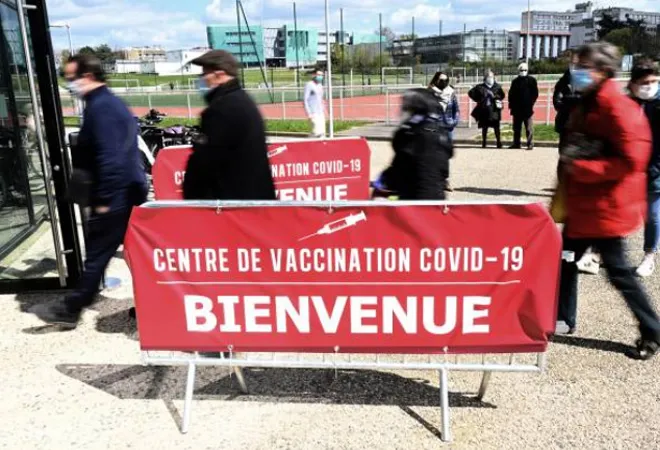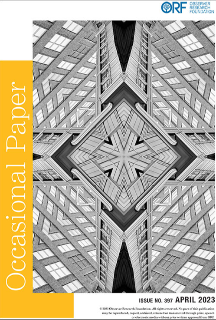 This article is part of the series The COVID-19 Vaccine Challenge: Contextual and Country Analysis.
This article is part of the series The COVID-19 Vaccine Challenge: Contextual and Country Analysis.
The vaccination campaigns that have been taking place in Europe have had a considerable impact on nations that were crippled by the pandemic. From a public health perspective, they have curbed infections on a national scale and protected the most vulnerable members of society from developing severe forms of the disease, resulting in a decrease in hospitalisations and deaths. From an economic perspective, vaccinations have given companies the ability to once again project themselves into a future, which, up until recently, was all too uncertain for many of them to start investing again. From a political perspective, these campaigns have been a test of governments’ operational capacities, as well as the ability of societies to rally in the face of such challenges. But the appearance of different variants demands that we do not lower our guard. Let us look back at the different phases of the vaccination campaign in France and the issues that remain going forward.
COVID vaccination in France: Where we stand
To reach collective immunity, around 80 percent (53 million people) of France’s population will need to be vaccinated. As of July 18, there were 37.5 million people in France that had received at least one dose of the COVID vaccine, and 30 million that were fully vaccinated. In total, 63.2 million doses have been administered across France, compared to 87.1 million in Germany or 82.6 million in the UK. This leaves France slightly behind the rest of Europe. As of 15 July , 55.44 percent of EU inhabitants had received at least one dose of the vaccine. Though this number is high compared to the rest of the world, EU still trails behind the UK (67.32 percent), Israel (66 percent), and the United States (54.79 percent).
As of July 18, there were 37.5 million people in France that had received at least one dose of the COVID vaccine, and 30 million that were fully vaccinated.
Three stages of French vaccination drive-
Step 1 - Slow start. The first phase of the vaccination campaign, which targeted older people living in nursing homes, began on December 27, 2020. This initial stage of the campaign was initially criticised for its sluggishness, not only when compared to other EU countries but also to the United States, Israel and the United Kingdom, who all got off to much quicker starts.
Step 2 - Acceleration. If the initial stages of the campaign were sluggish, it was mainly due to shortages and logistical issues. To get back on track, the government first had to tend to these issues and then make changes to its calendar: Vaccines were made available to healthcare professionals over the age of 50 on 4 January, and to all people above 75 years of age on 14 January. Healthcare professionals became eligible for vaccination on February 6, followed by at-risk populations aged 50 to 64 on 19 February.
Step 3 - Mass coverage. On March 27, all persons aged 70 and over were made eligible, and by April 12, the minimum age was moved down to 55 years of age. People with co-morbidities have been able to receive the vaccine from May 1, and 10 days later, the minimum age was lowered to 50. The entire adult population has been eligible for vaccination since May 31, and since June 15th, adolescents have been able to receive jabs.
Vaccines were made available to healthcare professionals over the age of 50 on 4 January, and to all people above 75 years of age on 14 January.
Thus, the government’s strategy has been to progressively broaden its target population, and to adapt its organisational structures accordingly by progressively opening vaccination centres throughout the country. This strategy has also included giving general practitioners doses of the vaccine for them to inject from their office or clinic. This ability was extended to pharmacies on March 15.
A slow start in a context of limited supply
France has had to face multiple challenges from the onset of its vaccination campaign. First, the COVID vaccination campaign has faced logistical challenges that far surpass routine vaccination campaigns. Most available vaccines require two doses, with intervals between 21 and 28 days for each dose, and require extremely low storage temperatures.
Then came digital challenges. The logistics of developing and tracking vaccines require that powerful and complex information systems be developed and made available to various actors involved in the vaccination process. These information systems must be compliant with very strict legislation around the protection of data. The data produced by these systems is essential for the long-term functioning of vaccine surveillance systems.
The logistics of developing and tracking vaccines require that powerful and complex information systems be developed and made available to various actors involved in the vaccination process.
There are also human challenges. These challenges include the administration of the vaccine itself, but also the ability to receive people whilst respecting social distancing protocols and creating temporary facilities. The French vaccination campaign was only successful because of the outstanding efforts made by a great number of paid staff as well as volunteers, which allowed the campaign to go on without disrupting the normal functioning of hospitals and general practitioners.
Furthermore, running a successful COVID vaccination campaign requires high levels of coordination between the following key actors: The state and its resources—both at the centralised level and at the local level (ministries, regional health agencies, etc.); local authorities—regional councils, departmental councils, mayors; healthcare professionals—general practitioners, and paramedical professionals; civil society—civil defense organisations, patient organisations; and private actors—healthcare companies, logistics and transport companies, digital actors, etc.
An increase in vaccinations in the spring to gradually lift restrictive measures
Digital platforms have played a critical role in keeping citizens up to date with the state of the virus and vaccinations. Websites such as Doctolib and KelDoc, which were initially designed as scheduling services for health practitioners, were tasked by the state to organise vaccination appointments. Other platforms, such as COVIDTracker, provide tools that allow users to visualise the large amounts of publicly available data related to the COVID-19 pandemic: Number of confirmed cases in France and abroad, number of people in intensive care, incidence rates in different regions, etc. A few months ago, the creators of COVIDTracker released a tool called “VaccineTracker”, which presents data on the vaccination campaign. More recently, the website added a feature, “Vite ma dose!”, which allows users to find vacant last-minute vaccination appointments.
The rapid increase in vaccinations was also the result of rapidly increasing levels of trust in the vaccine. According to a Cevipof survey, 65 percent of French citizens over the age of 18 now want the COVID vaccine. This number is up an impressive 16 percent since January. In parallel, the number of vaccine skeptics has dropped by 10 percent, to only 20 percent of the adult population. Thirteen percent of those surveyed remain hesitant, according to the survey. This can be explained by the fact that unvaccinated French people are more likely to be hesitant about the vaccine than to be actual anti-vaxxers. The evidence base that now exists on the vaccine, as well as the information provided by health authorities on the merits of vaccination and the drastic decrease in hospitalisations have all led to a progressive restoration of confidence in the vaccine.
The government hopes that these measures will push hesitant people to get the vaccine, as the number of people receiving first doses has declined over the past few weeks.
Although the increase in vaccinations has been successful in containing the virus, the emergence of the highly contagious Delta variant has led the government to prepare a host of restrictions for unvaccinated people that will take effect at the end of the summer. The government hopes that these measures will push hesitant people to get the vaccine, as the number of people receiving first doses has declined over the past few weeks. For now, this seems to be the case—Emmanuel Macron’s announcements to encourage vaccination had caused an initial surge in appointment booking. On 12 July, according to the Doctolib platform, 926,000 French people booked a slot to receive their first injection—an absolute record.
Starting in August, the COVID certificate will be mandatory in cafés, bars, and restaurants (even on terrasses), as well as in shopping malls, hospitals, and nursing homes. It will also be required when boarding planes, trains, and long-distance buses. These new regulations will be packaged into a law, which will be examined by the Parliament at the end of July. Furthermore, healthcare professionals will be required to get vaccinated starting September 15, 2021. This particular measure is supported by 76 percent of citizens.
Unsurprisingly, the French do not want to return to the worst days of the pandemic, where the number of dead and very sick were growing exponentially and people’s liberties were limited by lockdowns and curfews. Thus, the French are generally favourable towards the COVID certificate, which allows the government to take steps to control the virus while limiting restrictions on vaccinated individuals. The government’s priorities should now be to invest more in reaching vaccine-hesitant populations, particularly young people, and anticipate the campaign to administer third doses of the vaccine to the most vulnerable segments of the population.
The views expressed above belong to the author(s). ORF research and analyses now available on Telegram! Click here to access our curated content — blogs, longforms and interviews.



 This article is part of the series
This article is part of the series  PREV
PREV


